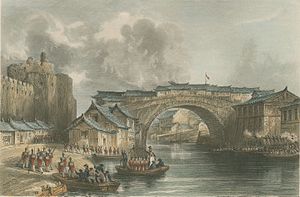Battle of Zhenjiang
| date | July 21, 1842 |
|---|---|
| place | Zhenjiang , China |
| output | British victory |
| Parties to the conflict | |
|---|---|
| Commander | |
| Troop strength | |
| 33 warships, 7,000 infantry |
Approx. 8,000 soldiers and militiamen |
| losses | |
|
39 dead |
239 dead |
At the Battle of Zhenjiang during the First Opium War , British troops captured the strategically important southern Chinese city of Zhenjiang on July 21, 1842. The defeat marked the end of Emperor Daoguang's efforts to bring the war to an end on its own terms of peace. For the British side it opened the way to further advance on Nanjing .
prehistory
Zhenjiang, also called Jingkou , is located at the intersection of the Yangtze and the Imperial Canal . The city was an important trading center and was regularly garrisoned by 1,185 banner soldiers. These were reinforced by 400 in early 1842 after further defeats by the British. By July 1842 an additional 6,300 soldiers and militiamen were brought in as reinforcements. The military commander of Hailing City had advised further reinforcements with artillery and fortifications, but had been turned down by provincial governor Niu Jian . On July 13, he briefly arrived in Zhenjiang and ordered an attack with around 150 fire boats and rafts on British ships off Zhenjiang. The attack was unsuccessful. On July 15, Hailing had the city gates closed and a state of siege declared. Tensions between Han Chinese and Manchu increased under Hailing's rule of the city . The military commander had his soldiers hunt down alleged traitors and publicly execute at least thirteen Han Chinese as traitors.
After the Battle of Wusong in June 1842, which made it possible for the British to occupy Shanghai , the British expeditionary corps began preparing to advance towards Nanjing via Zhenjiang from the beginning of July. The Commander-in-Chief Henry Pottinger waited for reinforcements from British India to arrive . By July 20, 1842, the British side had assembled 23 conventional warships, ten steam-powered warships and around 7,000 ground troops on 51 transport ships. The deployment of the British Naval Union began in early July 1842 and was completed on July 20.
course

On July 21st, the British fleet opened the battle for the city with the landing of the ground troops and a simultaneous bombardment of the Chinese artillery positions. The British surrounded the city from the north, west and south, but they did not use artillery against the city walls. The banner soldiers used to defend the city were initially able to push back the British on the west side of the wall. However, in a second attack, British troops were able to blow up the western gate and enter the city. The resistance of the Qing troops collapsed by the end of the day.
consequences
British forces lost 39 dead, 130 wounded and three missing. The Qing troops counted 239 dead, 169 wounded and 73 missing. Around a third of the banner soldiers, but only around one in a hundred soldiers of the Green Standard died in battle. Hailing was lynched by a crowd of townspeople after the battle. According to other reports, he committed suicide. After the battle, there were rumors among the population that the British had used the attack to forestall a massacre of real or supposed collaborators.
News of the loss of Zhenjiang reached Emperor Daoguang on July 27th. The defeat prompted him to instruct his subordinates Qiying and Niu Jian to accept their peace terms in the negotiations with the British that had been ongoing since May 1842. The peace agreement was preceded by the invasion of Nanjing by the British, who advanced shortly after the capture of Zhenjiang.
Individual evidence
- ↑ a b c d e Mao Haijian: The Qing Empire and the Opium War - The Collapse of the Heavenly Dynasty. Cambridge 2016, pp. 384-391
- ^ A b Julia Lovell: The Opium War. 2nd edition, London 2012, p. 216 f.
- ↑ Mao Haijian: The Qing Empire and the Opium War - The Collapse of the Heavenly Dynasty. Cambridge 2016, pp. 392-405

